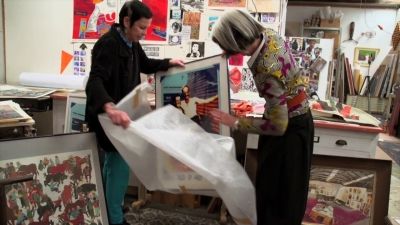A Journey Through Asian Art
A Journey Through Asian Art
Red Ink (1x5)
:
In 1930s Shanghai the writer Lu Xun asked artists to create woodblock prints that showed the hardship of life. Woodblocks had been developed in China centuries before, but it was the more recent work of Kathe Kollwitz that inspired the return to the form.
After the revolution Mao could see the value of this form of art as propaganda. Alison Carroll explains that the mass produced prints even helped to make Chinese people literate.
After the Cultural Revolution the prints become bigger and simplified. The strong graphic political style which developed was influential around the world, particularly in the 1970s, and Carroll visits Australian printmaker Ann Newmarch to discuss how this Chinese art practice spread into Australasia and influenced Newmarch’s work.
By the end of the twentieth century the graphic style of the prints had evolved into ironic canvas works that critiqued the regime, but were no longer created for mass consumption
